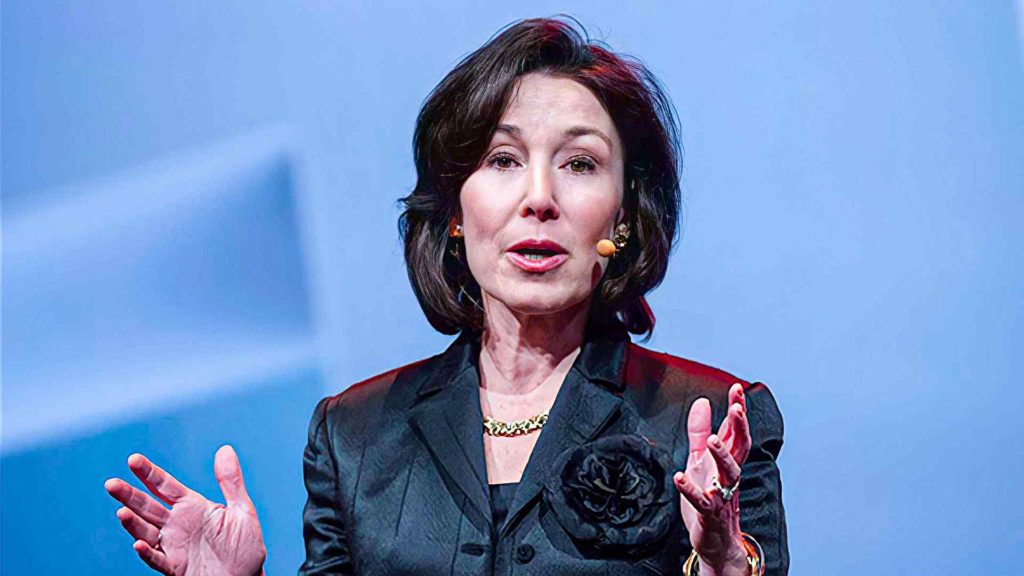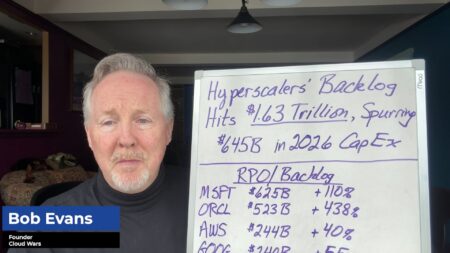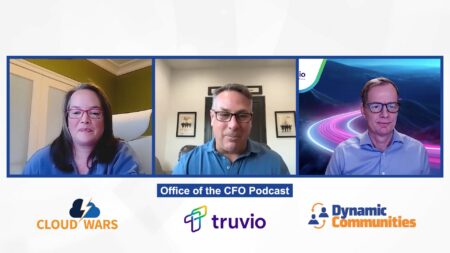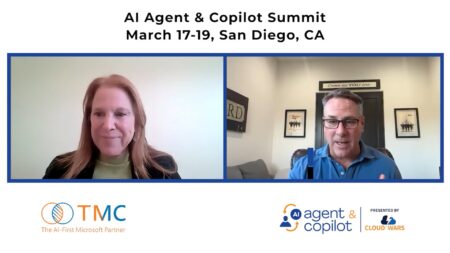
While the degree of difficulty for changing the culture of a middle-aged engineering-driven company ranks somewhere between improbable and impossible, Safra Catz says Oracle has spent the past few years mastering the art of putting its customers instead of its code at the center of Oracle’s universe.
“That’s the big difference,” Catz said late last year at Oracle CloudWorld. “Instead of just selling our customers stuff, our real job is to actually partner with them to run their businesses.”
Catz — who last month was named Cloud Wars CEO of the Year for 2022 — clearly admitted that was not always the case at Oracle, and that her company is committed to proving via its tens of thousands of cloud-customer engagements that customer success is the new top priority.
Catz shared her ideas late last year on what Oracle customers can expect for 2023 during a 1:1 interview and also as part of the company’s Financial Analyst Meeting.
“So the big change for us — and I hope you’ve seen it — and the way we used to sell a product is that our geniuses in their ivory towers would build a product and throw it out to a customer,” Catz said in her inimitable style of storytelling that artfully blends obvious exaggerations with blunt truths.
“And they’d lean out and say, ‘Give us a call if you need help, but we’re hoping you’re smart enough to know how to use it.’ And then the SI and the customer would implement the product — sometimes with some help from Oracle Consulting — and that was the relationship until our geniuses came out with something new and would throw it out the window again.
“Now, I’m only kidding — but not entirely.”
Because as the world surges to the cloud, and as Oracle has become for a variety of reasons the world’s fastest-growing major cloud provider, that ivory-tower isolation has been replaced with something bordering intimate cohabitation.
As Catz put it, “We now have to basically move in with you. And live in the townhouse with you. And the customer’s on this side and Oracle’s on that side.
“They’re totally connected,” Catz said, “because we basically get rid of the wall between our two enterprises: us and you.
“And the nicest thing I hear from customers — the thing that really makes me smile — is when they say things like, ‘I cannot tell where my people stop and your people start.’
“This is so powerful for us!”
Of course, every company in the Cloud Wars Top 10 is subscribing to some variation of “it’s all about the customer.” But what’s different with Oracle is that it’s building that new sort of institutional muscle while maintaining its traditional strengths in advanced technology and its affinity for tackling extremely complex challenges.
So if it’s able to keep customers at the center of the new cosmology Catz described, then customers will receive the gift of high-intensity competition vying for their hearts, minds, and wallets in the greatest growth market the world has ever known.
That intimacy was reflected during Catz’s keynote at CloudWorld as a series of customers joined her on-stage for conversations about innovation and new capabilities and growth and transformation and life in the digital-first world. I asked Catz about one of those customers — a fast-growing toymaker called Melissa and Doug — whose executives, at the end of their conversation, presented the Oracle CEO with some of their toys.
And her response — totally spontaneous and genuine — was an indicator to me that Oracle has turned “customer success” from a slogan to a core element of its culture.
“Oh, it was so fun for me!” Catz gushed.
“Was it that obvious? When they brought me the toy I almost started crying! I was like, ‘Oh no, don’t’ — because it’s such a thing with these customers!”
Every Customer Is Important
In describing the challenge she faced a few years ago when Catz became the sole CEO following the tragic death of Mark Hurd, Catz said her first 20 years at Oracle as the head of operations and for a while as CFO gave her keen insights into the challenges customers face every single day.
“And after we lost Mark, all of a sudden, I was responsible for sales. Well, what do I know about that? But what I do know is being a customer — so I know about being a customer as a back office. And I learned that, as a cloud company, we don’t just sell you something and say, ‘See ya — good luck with that — call us if you need us!’
“And now it’s not ‘I just sell you something’ — instead, it’s ‘I run that something’ — that’s my responsibility. And if I go down, the business is ruined.
“So we have to have this whole customer focus all the time.”
A profound example of that new and end-to-end focus on customers has been chairman Larry Ellison’s unconditional commitment to automate and transform the entire healthcare industry: from helping researchers identify new illnesses and potential large-scale threats, to helping pharmaceutical companies accelerate clinical trials while also boosting their efficacy, to helping hospitals more effectively manage inventory and schedule doctors and nurses.
Industry-Specific Solutions and the Need for Modern Systems
And while Ellison’s healthcare “mission” has gotten significant attention, Oracle is also aggressively infusing industry-specific capabilities into most of its products for every vertical market, Catz said, in large part because traditional systems simply cannot handle the demands of modern digital business.
Speaking to the financial analysts at CloudWorld, Catz explained that legacy systems are moving from being inefficient to being downright dangerous to a business’s viability.
Talking about some of the financial costs related to old systems, Catz said, “You know how I just asked you, ‘How do you feel like saving 90% [by moving to the Oracle Cloud]?’ That’s pretty compelling — that’s not just a little bit of savings.
“And many folks now know this — look, some folks barely got through the pandemic with their shirts on — it was pretty rough for some of them,” she said. “They could not really adjust well and some didn’t make it all the way through.
“Those that did, realized the limitations of their systems, and they realized they did not have digital connections at all with their customers, with their employees, with their suppliers. I mean, it was pretty hairy.
“I was meeting with a hospital system that had to implement HCM in the cloud during the pandemic because they could not otherwise staff the hospital,” she said.
“And so everybody realized they needed a much better understanding of digital connections with everything that matters. Just think about that supply-chain Armageddon we lived through.”
It’s not that the old systems failed; it’s just that they were suddenly faced with business conditions and expectations that those old systems were never intended to handle. In the same way, tech vendors that did not radically change their approach to customers and make them “the center of the universe” — with an unrelenting focus on customer success — are finding it impossible to compete in the Cloud Wars of today.
And Catz is vowing that Oracle has made that leap — and from my perspective, the best evidence of her claim is the company’s cloud-revenue growth rate over the past two quarters: 45% and 43%.
“Businesses today just can no longer do it on those old systems. They can’t forecast anymore. They have to understand their inventories better, and they can not go through another massive shock like the pandemic without moving into the 21st century.”
It is, she told me late last year, all about the customers. And while Oracle will always be a company that aggressively drives advanced engineering and technology and vision, its new commitment to customer success is now at the center of the company culture because, without that, all the most whiz-bang technology in the world won’t matter.
“And customers really feel it! We’re working with them so closely that you cannot see where their team stops and the Oracle team begins. That’s the kind of mission we bring on board every day and it’s the reason we work the way we do,” Catz said.
“As you can imagine, who still have a lot of Oracle employees who were with us way back when our stock price split-adjusted was 5 cents, okay? So they do not actually need to come to work. So why are they coming to work?
“Well, we’re on a mission, and we love winning, and we love being together and solving these problems, and you kinda can’t get in our way. You can count us out, you can call us a dinosaur, you can do all of those things.
“But when the going gets tough, we’re there.
“We’re always there.”
Sign up here for the CEO Outlook Digital Summit to start your free subscription and see all of the Cloud Wars Top 10 CEO Outlook interviews that will air on February 8, 2023, or upgrade to Premium and get your all-access pass to our entire practitioner analyst library of content









